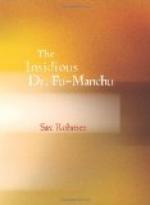Transfixed with astonishment, I stood looking down upon him. The wonders of the “Arabian Nights” were wonders no longer, for here, in East-End London, was a true magician’s palace, lacking not its beautiful slave, lacking not its enchanted prince!
“It is Aziz, my brother,” said Karamaneh.
We passed down a stairway on to the floor of the apartment. Karamaneh knelt and bent over the boy, stroking his hair and whispering to him lovingly. I, too, bent over him; and I shall never forget the anxiety in the girl’s eyes as she watched me eagerly whilst I made a brief examination.
Brief, indeed, for even ere I had touched him I knew that the comely shell held no spark of life. But Karamaneh fondled the cold hands, and spoke softly in that Arabic tongue which long before I had divined must be her native language.
Then, as I remained silent, she turned and looked at me, read the truth in my eyes, and rose from her knees, stood rigidly upright, and clutched me tremblingly.
“He is not dead—he is not dead!” she whispered, and shook me as a child might, seeking to arouse me to a proper understanding. “Oh, tell me he is not—”
“I cannot,” I replied gently, “for indeed he is.”
“No!” she said, wild-eyed, and raising her hands to her face as though half distraught. “You do not understand—yet you are a doctor. You do not understand—”
She stopped, moaning to herself and looking from the handsome face of the boy to me. It was pitiful; it was uncanny. But sorrow for the girl predominated in my mind.
Then from somewhere I heard a sound which I had heard before in houses occupied by Dr. Fu-Manchu—that of a muffled gong.
“Quick!” Karamaneh had me by the arm. “Up! He has returned!”
She fled up the stairs to the balcony, I close at her heels. The shadows veiled us, the thick carpet deadened the sound of our tread, or certainly we must have been detected by the man who entered the room we had just quitted.
It was Dr. Fu-Manchu!
Yellow-robed, immobile, the inhuman green eyes glittering catlike even, it seemed, before the light struck them, he threaded his way through the archipelago of cushions and bent over the couch of Aziz.
Karamaneh dragged me down on to my knees.
“Watch!” she whispered. “Watch!”
Dr. Fu-Manchu felt for the pulse of the boy whom a moment since I had pronounced dead, and, stepping to the tall glass case, took out a long-necked flask of chased gold, and from it, into a graduated glass, he poured some drops of an amber liquid wholly unfamiliar to me. I watched him with all my eyes, and noted how high the liquid rose in the measure. He charged a needle-syringe, and, bending again over Aziz, made an injection.
Then all the wonders I had heard of this man became possible, and with an awe which any other physician who had examined Aziz must have felt, I admitted him a miracle-worker. For as I watched, all but breathless, the dead came to life! The glow of health crept upon the olive cheek—the boy moved— he raised his hands above his head—he sat up, supported by the Chinese doctor!




